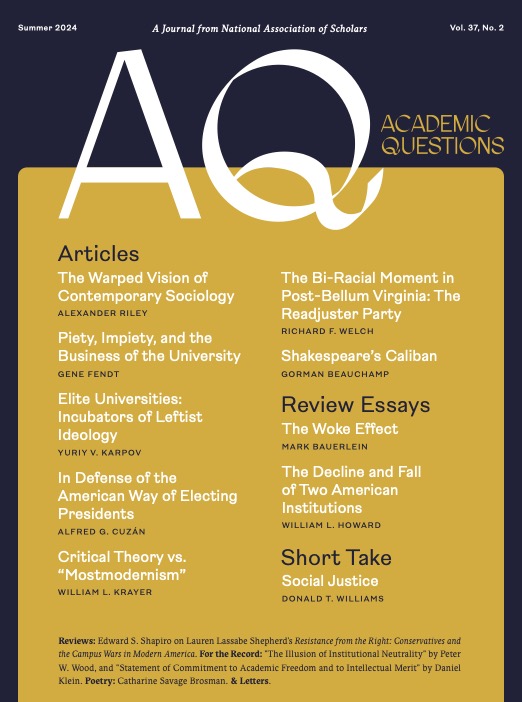To the Editor:
I will try to be brief. I thoroughly enjoyed Edward S. Shapiro’s essay “Remembering Harvard” in Academic Questions (Winter 2023) on Harvard in the early 1960s. I was an undergraduate at Harvard 1960-64 majoring in history. Morton Keller was my senior thesis adviser. The biggest influences on my decision to major in history were Oscar Handlin and Bernard Bailyn.
To say the least, I was not all that distinguished a scholar in those years. But a letter of recommendation from Handlin got me a three-year scholarship to do history and education in the UW-Madison's Educational Policy Studies department and this fixed my fate as a lifetime resident of the Midwest (Madison area until 2010, Michigan ever since.) I do not regret that, but I do regret (somewhat, it's complicated) the way Madison's New Left attracted/distracted me and waylaid me for a very long time. Since the 1980s, I have returned to a viewpoint very close to what you depict as Handlin's in his later years. Since 1984, I've been involved in creating history materials for K-12 schools. Of late, I have been working with David Randall of NAS on a civics curriculum based on the American Birthright standards.
I won't bother you with more, though I could easily go into it all in greater depth. I just wanted to thank you for the article, which brought back to me how unbelievably fortunate I was to be at Harvard then and to benefit, however inadequately, from the giants in the field. During this past year, I've been keeping up with Harvard's truly sad state mainly by remarking on events in the comments sections of the Harvard Crimson. Your essay makes so painfully clear how far the place has fallen, and how lucky I am to have seen its better days.
Sincerely,
Jonathan Burack
East Lansing, MI 48823
To the Editor:
Regarding “white flight” (“Was Newark’s ‘White Flight’ Racist?,” Winter 2023), I grew up in a row house in Philadelphia’s Kensington neighborhood. Today, Kensington is one of the country’s most crime-ridden drug dens. I moved out in 1967 to attend graduate school out of state when Kensington was a fairly stable and mostly white, ethnic, working-class neighborhood. My white parents sold our row home and left in 1973, not because of crime or race, but because my father’s income and savings had reached a level at which my parents, both of whom grew up in Kensington, could buy a free-standing home with some grass around it. For my father, this purchase was the pinnacle of success after having attended night classes for sixteen years to earn a B.S. degree by 1961 and working himself up from poverty and taking my “housewife” mother with him.
John Kincaid
Lafayette College
Easton, PA
To the Editor:
I read with reward and avidity Stephen Kershnar’s review (“Was Newark’s “White Flight” Racist?,” Winter 2023) of Jack Cashill’s book Untenable: The True Story of White Flight from America’s Cities. I have not yet read the book but Kershnar’s account of it strikes true notes. I grew up a twenty minute trolly ride west of downtown Newark in Glen Ridge, a 7,000-resident town tucked between Bloomfield and Montclair. I graduated from high school in '56 so the Newark I knew was the Newark the author knew.
New York City was of course the big thrill go-to place but Newark was then an okay fallback. Besides Bambergers there was Lord & Taylor and Hayne & Co. Road companies still existed and it was not unusual for there to be two of them in Newark at the same time. The Jersey Symphony played at the handsome Mosque Theater. So did scores of entertainers (Sarah Vaughan, the Royal Ballet of Canada etc etc). The mafia was low-key subsets of New York outfits. Small, tight units; you would have to know a lot about Newark to know about them. Mostly numbers, some loan sharking, small time extorsion and shake downs, mostly in the unions. But no gun fights and barber shop killings. I listened to the local Puerto Rican radio station in a futile effort to grasp spoken Spanish.
Yup! Weequahic H.S. was tops and its football team (the game against Paterson was the most important one of the season) was a mean outfit. My town was in the Newark Diocese and we Roman Catholics were overly proud that the cathedral in Newark was bigger and more beautiful than St Patrick's. The Italian religious processions were a serious deal and the Italian weddings remarkable. But my older brother and his pals crashed not them but the Polish weddings for the free beer and food. A small Portuguese enclave gave birth to two Portuguese restaurants which I think are still there. Eating at the Robert Treat and Carteret hotels was a nice outing.
Newark Prep was solid and so was St. Benedict Academy. The Newark Art Museum was then, as it still is, one of the great ones in North America. It became great in part from generous support by genteel families like the Dutch-stock Frelinghuysen’s. Downtown Newark with a large green park setting was safe and winsome. There sits today as it did then, the attractive brownstone Episcopal cathedral (as in the faces of many a Manhattan residence).
The Newark Bears, a longstanding farm team of the Yankees, was dying out in my high school years (because of TV) but I remember a summer's double header that our Italian gardener took me to. I didn't yet know baseball and he never learned English. My memory sees a packed attendance.
You can't make it up, as the saying goes, but there were a lot of quirky things about Newark. Minskey's Burlesque was just off the main drag. For several presidential elections a pig farmer named Henry Kajewski, ran on the Poor Man's ticket. There were two solid newspapers then, the Newark Evening News and the Newark Star Ledger. Kajeweski got a good deal of coverage therein by walking four pigs on leash through downtown, waving his Stetson. Ah, well, nostalgia isn't what it used to be.
John Adam Moreau
Mobile, Alabama
To the Editor:
I read with keen interest the article by R. Lawrence Purdy, “Our Service Academies Must Discard Race-Based Admissions” in the winter 2023 issue of AQ. His analysis of the flag officers’ opposition to eliminating race-based admission practices was spot on. Unfortunately, it is only the tip of the iceberg. It is but one aspect of the “Wokeism,” the inchoate pestilence that afflicts the education system, government, the corporate world, and now the military. As a graduate of the 1959 West Point class, I can assure you that many old graduates (and many new ones as well) are outraged and saddened by the gradual dismemberment of the values and traditions that made West Point the great military academy from which we graduated.
Of course, the defenders of the erosion of traditions and the requirements for admission will aways respond in little phrases like “the train has left the station,” or amused eye rolling at the inability of the old grads to come to terms with the new and better academy—one that has joined the brave new world. The new unspoken slogan is—let the academy join you. Rather than maintain West Point traditions that are absolutely necessary to build soldier and warrior ethos, the current leadership bends to the winds of fashion and political correctness. And here I am not advocating emphasizing hazing as the answer to building a soldier ready for the realities of combat, but a system that tests and builds the confidence of the cadet. Mealy mouthed fealty to the current idiocy of half-baked social engineering ideas do not produce a Soldier-Scholar but one that is neither.
I served in the “Carter army,” the army of the seventies in which the Army was in total disarray with a major part of the problem being the racial tension which was increased by top-down requirements to have racial awareness classes for the troops. I remember how the troops emerged from those classes with increased hostility toward one another. The current daily drumbeat on race only exacerbates the problem, and giving one race preferential treatment in admissions does exactly what one of the Black generals in the article decried—the idea that he got there because of his race. DEI engrains the idea that once was current—the “Lincoln Brigade” of West Point officers who allegedly received preferential treatment in promotions. Whether true or not it was widely believed.
The mediocre record of our army in our modern conflicts beginning with the Vietnam war, is reflected in the fact that all respected analytical writers on military affairs, to some degree, single out general officer ineptness. Our success against the second rate, ill- trained, ill-equipped, and totally unmotivated Iraqi troops might be considered an exception, but the succeeding era of poorly conceived and even more poorly executed counter-insurgency negated the success of the conventional war.
Why are our generals and admirals not focusing on general officer leadership instead of cultural social engineering? I have a bookshelf full of books on the recent conflicts and every one points a finger at the failure of top leadership, exemplified by the disgraceful debacle at Kabul. Not only was their leadership inadequate, but equally disgraceful was their frequent Pollyanna prevarication before congress and the American people.
Exactly how does DEI improve the army? How will it improve the performance of our top military leadership? One often hears the shibboleth; the American army is a microcosm of American society. Let us hope to God that is not true. The slothful, obese, ill-educated youth that I observe every day are not representative of the American soldier. Perhaps a draft without any exclusions can solve this cultural decay before it is too late. This is among the many critical subjects the general officers should be talking and writing about.
As the son of a career non-commissioned officer, a World War I veteran, and my own career of twenty-six years of service capped by teaching special operations officers at Ft. Bragg for another eighteen years as a civilian, I think I am qualified to speak out. I saw the army at its best when my 1st Infantry Division battalion departed Ft. Riley in 1965 for Vietnam, and the worst when I returned to the 1st Infantry Division in 1973. The first soldier I met going to my unit gave me the black power salute. It went downhill from there. As my great Ottoman history professor Zeine N. Zeine at the American University of Beirut frequently reminded the students, all empires, like fish out of water, always begin to rot at the head.
Perhaps, the more culturally attuned officers, sensitive to the current political winds, will see me as just another angry old colonel. They would be right. I am old and very angry as I see my country and army descend to third world status, and military leadership oblivious, or mesmerized by a pervasive medal mania with cowardly deference to a corrupted political administration.
Norvell B. DeAtkine
Colonel, US Army (retired)
Southern Pines, North Carolina














